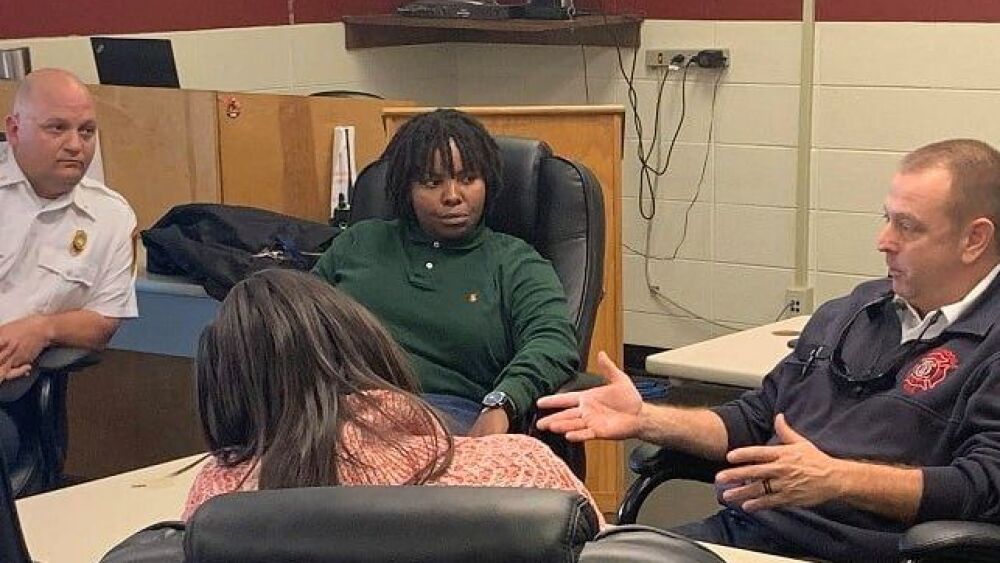Elizabeth Fite
Chattanooga Times/Free Press, Tenn.
CHATTANOOGA, Tenn. — Chattanooga Fire Department Capt. Skyler Phillips fought back tears Tuesday as he told City Council members the story of a nearly blind woman with broken glasses who used to regularly call 911 seeking help after tripping and falling.
This fall, the department launched a new program, CFD Connect, that seeks to connect frequent non-emergency 911 callers with social services that proactively address their problems before they turn to calling for emergency help. Since outfitting that woman with a new chair and glasses, she hasn’t called 911 a single time, said the emergency medical services coordinator for the fire department.
The saddest part is how common these cases are, Fire Training Chief William Andrews told the council.
When they get the calls, first responders recognize the addresses. They know the callers by name.
“We get to know these people so well, and they get to know us and how we work. They will try to do everything they can, but we always tell them ‘If you need us, call us. We’re coming,’” Andrews said during Tuesday afternoon’s council meeting. He recalled a woman who would lay on the floor all night after falling. She didn’t want to wake up the firefighters, so she’d wait to call 911 after the morning shift change.
Firefighters’ stories from the front line are changing. As the population ages, departments around the country are seeing a dramatic increase in non-emergency, citizen assist calls. And while the fire department might be the first agency to respond, it’s not necessarily the best. That’s because often what callers actually need is a new walker, help reaching a medicine bottle, a rug that doesn’t slip or health insurance.
While firefighters already respond to most 911 calls, including medical emergencies, they don’t know what they’ll find until they arrive. So, they bring the whole crew, which costs an estimated $130 per citizen assist, according to Chattanooga Fire Department data.
Through CFD Connect, 13 of the department’s most frequent callers got the help they actually needed. The program embeds in the fire department two interns — graduate students studying social work at the University of Tennessee at Chattanooga. The interns created forms, a resource guide and visited those who called the most.
Along with firefighters, they conducted needs assessments to determine the reasons behind the non-emergency 911 calls, said Phillips.
“We have to figure out why people need our help, and then we can look for resources in the community to meet that need, as opposed to reactively responding,” he said.
One regular caller, Jeffery Henson, was the inspiration for the program, Phillips said. The department responded to calls from Henson’s medical alert device 72 times in 2017. That figure doubled in 2018, and in January and February of 2019, firefighters responded to Henson 109 times. Since they intervened, from March until December 2019, Henson has only called 36 times. Phillips said that has saved the department an estimated $66,000 that would have been spent responding to non-emergency calls.
April Wilson, social work clinical instructor at UTC, said often it’s a lack of knowledge, fear or even pride that causes people to call the fire department instead of another agency.
“These are folks that have served graciously for our country. These are folks that have led corporations. These are folks that had identities,” Wilson said. “The onus falls on us to really affirm for them and say that we’re here to help.”
The interns worked 16 hours a week for three months. During that time, the number of calls from those 13 people decreased 63%, from 70 calls in the three months before they started, to 26 calls.
Andrews said they didn’t create any new resources or spend money. The interns and firefighters worked with local partners to proactively connect callers to services already in the community.
“We want to try to prevent these people from falling, because every firefighter can tell you they respond to the same person needing help, and sooner or later they’re going to have that catastrophic injury,” he said.
Chattanooga Fire Chief Phil Hyman said he anticipates the use of social work within the department will continue to grow.
“That’s where I want to see our next generation of firefighters going,” Hyman said. “When we teach them their [emergency medical technician] skills, there should be a piece of the social work program inserted in all that — not only are you treating someone for medical issues, but you also have to identify needs when you go into someone’s home.”
The department plans to request funding for one additional position to support their efforts in next year’s budget.
“There are a lot more people out there that need help,” Andrews said, “and we don’t want to take away from what we were truly designed to do — those true 911 emergencies.”
———
©2019 the Chattanooga Times/Free Press (Chattanooga, Tenn.)












